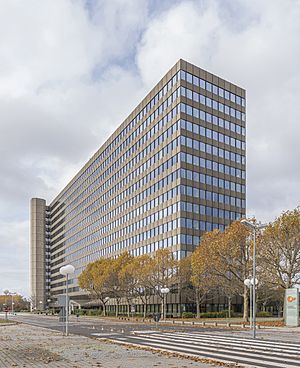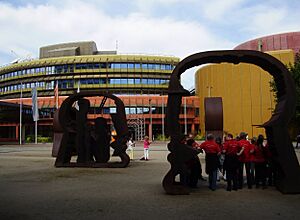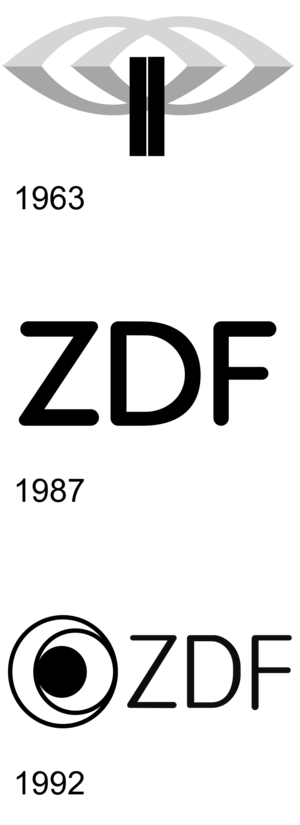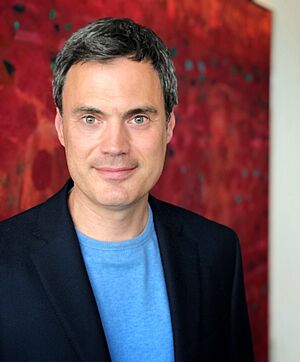ZDF facts for kids
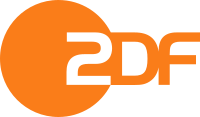
Logo used since 2001
|
|
| Country | Germany |
|---|---|
| Broadcast area | Germany |
| Headquarters | Mainz, Germany |
| Programming | |
| Language(s) | German |
| Picture format | |
| Ownership | |
| Key people | Norbert Himmler (director) |
| Sister channels |
|
| History | |
| Launched | 1 April 1963 |
| Replaced | ARD 2 (1961–1963) |
| Availability | |
| Terrestrial | |
| Digital terrestrial television | Varies by location |
| Streaming media | |
| ZDF.de | Watch live (Germany only) |
| FilmOn | Watch live |
| ZiggoGO | ZiggoGO.TV |
| Canaldigitaal Live App | Watch Live |
ZDF (which stands for Zweites Deutsches Fernsehen, meaning "Second German Television") is a big public TV channel in Germany. It's based in Mainz, a city in the state of Rhineland-Palatinate.
ZDF started broadcasting on April 1, 1963. It's run as an independent organization that doesn't aim to make a profit. All the different states of Germany helped create it. ZDF gets its money from TV license fees and some advertising.
The channel is famous for its news show, heute, which began in 1963. Another popular show is Wetten, dass..?, a fun entertainment show that first aired in 1981. Norbert Himmler is the current director of ZDF; he was chosen in 2021.
Contents
The Story of ZDF
In 1959, the German government, led by Konrad Adenauer, started planning a second TV network for the whole country. They wanted it to compete with the existing channel, ARD.
The government felt that ARD's news was too critical of them. So, they created a new TV company called Freies Fernsehen Gesellschaft. People sometimes called it Adenauer-Fernsehen. This new company was set up on July 25, 1960.
The German postal service began building new transmitter towers for this second network. These towers used UHF channels, which meant people needed new equipment to watch. Older TVs could use a special converter. The towers were carefully placed so everyone in the country could get the new channel.
To test the new system, ARD was allowed to create a temporary channel called ARD 2. It broadcast every day from 8 to 10 p.m. ARD 2 started on May 1, 1961, in one region and then expanded across Germany.
How ZDF Was Officially Created
Some states in Germany, led by the SPD, went to court. On February 28, 1961, the court decided that only the individual states had the right to set up TV channels, not the federal government. This was because the German constitution says that powers not given to the federal government belong to the states.
After this court decision, in March 1961, the states decided to create a central public TV network together. On June 6, 1961, the state leaders signed an agreement to create "Second German Television." By July 9, 1962, all states had agreed.
When ZDF Started Broadcasting
ZDF officially began broadcasting from Eschborn, near Frankfurt am Main, on April 1, 1963. Karl Holzamer, the first director, gave a speech. In 1967, ZDF started showing programs in color. In 1974, ZDF moved its main offices to Mainz-Lerchenberg, where it is today.
In November 1995, ZDF made an agreement with NBC News to share news resources. Since October 5, 1996, ZDF has broadcast 24 hours a day, all the time.
How ZDF Gets Money
ZDF is paid for by a license fee of €18.36 per month. Almost all households in Germany pay this fee. People with disabilities or those receiving social help are usually exempt. ZDF shares this money with ARD and Deutschlandradio.
The fees are collected by an organization called Beitragsservice. ZDF also earns money from sponsorships, selling its programs, and advertising.
Other Channels by ZDF
ZDF also runs two other digital channels:
- ZDFneo: This channel is mostly for viewers aged 18 to 45.
- ZDFinfo: This channel focuses on documentaries.
Both ZDFneo and ZDFinfo are available in standard and high definition. ZDF also has a company called ZDF Studios GmbH. This company sells ZDF programs, buys programs from other places, and works with international partners to create new shows. ZDF Enterprises also owns a TV production company in the Netherlands called Off the Fence.
ZDF works with other networks on several channels:
- Arte
- 3sat
- KI.KA (a children's channel)
- Phoenix (a news and documentary channel)
ZDF's Look and Mascots
ZDF has famous animated characters called the Mainzelmännchen. These mascots were created by Wolf Gerlach for the channel's launch in 1963. They quickly became popular and are still shown between commercials today.
In 1976, a graphic designer named Otl Aicher created ZDF's overall visual style. A new design for ZDF was made by Lee Hunt in February 2000.
How ZDF Is Managed
The Director General
ZDF is led by a person called the Director General (Intendant). This person is chosen by the ZDF Television Council. The council is made up of people from different important groups in society.
Here are the Directors General since ZDF started:
- 1963–1977: Karl Holzamer
- 1977–1982: Karl-Günther von Hase
- 1982–2002: Dieter Stolte
- 2002–2012: Markus Schächter
- 2012–2022: Thomas Bellut
- 2022–present: Norbert Himmler
The Supervising Board
The Supervising Board checks the work of the Director General. They pay close attention to how the budget is used. This board has 14 members:
- Five people represent the German states.
- One person represents the federal government of Germany.
- Eight members are independent, meaning they don't work for the government.
The Television Board
The Television Board oversees ZDF and approves its budget. They also choose the Director General. This board has 60 members:
- Sixteen people represent the states of Germany.
- Two people represent the federal government.
- Two people represent Protestant churches.
- Two people represent the Catholic Church.
- One person represents the Central Council of Jews in Germany.
- Twenty-one people represent different groups in society.
- Sixteen members are nominated by the states, representing various social causes.
ZDF's Global Connections
ZDF became a full member of the European Broadcasting Union in 1963. This is an organization of public broadcasters across Europe. ZDF also works with many other TV channels around the world.
ZDF supports the Hybrid Broadcast Broadband TV (HbbTV) idea. This idea helps create a standard for TV boxes that can receive both regular TV and internet content, all with one easy-to-use menu.
Popular Shows on ZDF
ZDF broadcasts a wide variety of programs.
Shows for Kids
- 1, 2 oder 3 (1977–present)
- ALF (1988–1993)
- Alfred J. Kwak (1990–2003)
- Dog City (1995–1997)
- Fraggle Rock (1983–1995)
- Fun with Claude (2009–2015)
- H2O: Just Add Water (2006–2010)
- Löwenzahn (1981–present)
- Pablo the Little Red Fox (1999–2003)
- Pingu (1990–2004)
- Pippi Langstrumpf (1969–present)
- Tabaluga (1997–2007)
- Cosmic Quantum Ray (2009)
- Tabaluga tivi (1997–2011)
- The Muppet Show (1977–1989)
- Mia and Me (2012–present)
Culture Shows
- aspekte (1965–present)
- Das Blaue Sofa (2003–present)
- Das Literarische Quartett (1998–2006, 2015–present)
Documentaries
- 37 Grad (1994–present)
- Alexander the Great (2014)
- Die Deutschen (2008/2010)
- Terra X (1982–present)
- Terra Xpress (2011–present)
- ZDFzeit (2012–present)
- ZDF-History (2000–present)
Entertainment Shows
- Bares für Rares (2013–present)
- Die Anstalt (2014–present)
- Die Goldene Kamera (1973, 1986, 1989, 1990, 1992, 1994–present)
- Die Helene Fischer Show (2013–present)
- Die ZDF-Hitparade (1969–2000)
- Disco (1971–1982)
- heute-show (2009–present)
- Mainz bleibt Mainz, wie es singt und lacht (Carnival show) (1973–present)
- Wetten, dass..? (1981–2014, 2021–present)
- Willkommen 20xx (New Year's Eve show)
- ZDF Fernsehgarten (1986–present)
Information Shows
- Aktenzeichen XY… ungelöst (1967–present)
- auslandsjournal (1973–present)
- Berlin direkt (1999–present)
- drehscheibe (1998–present)
- Frontal21 (2001–present)
- hallo deutschland (1997–present)
- heute (newscast) (1963–present)
- heute journal (newscast) (1978–present)
- heute Xpress (newscast) (2015–present)
- Leute heute (1997–present)
- ML Mona Lisa (1988–present)
- Politbarometer (1977–present)
- Volle Kanne – Service täglich (1999–present)
- WISO (1984–present)
- ZDF-Morgenmagazin (1992–present)
- ZDFzoom (2011–present)
TV Series
- ALF (1988–1996)
- Bella Block (1994–present)
- Borgia (2011, 2013)
- Cologne P.D. (2003–present)
- Das Traumschiff (1981–present)
- Der Alte (1977–present)
- Der Bergdoktor (2008–present)
- Derrick (1974–1998)
- Die Bergretter (2009–present)
- Die Chefin (2012–present)
- Die Rosenheim-Cops (2002–present)
- Die Schwarzwaldklinik (1985–2013)
- Ein Fall für Zwei (1981–2013)
- Ein starkes Team (1994–present)
- Forsthaus Falkenau (1989–2016)
- Highway to Heaven (1987–1990)
- Kommissarin Lucas (2003–present)
- Küstenwache (1997–2016)
- Leipzig Homicide (2001–present)
- Letzte Spur Berlin (2012–present)
- Magnum, P.I. (2012–2015)
- Midsomer murders (2005–present)
- Notruf Hafenkante (2007–present)
- Siska (2002–2010)
- SOKO 5113 (1978–present)
- Star Trek (1972–1982)
- Star Trek: The Next Generation (1990–1993)
- The Muppet Show (1977–1989)
- The Simpsons (1991–1993)
- Unser Charly (1995–2012)
- Wilsberg (1999–present)
Sports Shows
- das aktuelle sportstudio (1963–present)
- FIFA World Cup (1966–present)
- UEFA European Championship (1964–present)
- UEFA Champions League (Final Only)
Talk Shows
- Dunja Hayali (2015–present)
- Johannes B. Kerner (1998–2009)
- Markus Lanz (2008–present)
- Maybrit Illner (1999–present)
- Peter Hahne (2010–2017)
- Zeugen des Jahrhunderts (1979–present)
Audience in Germany
ZDF is a very popular channel in Germany. Here's a look at its audience share over the years:
| January | February | March | April | May | June | July | August | September | October | November | December | Annual average | |
|---|---|---|---|---|---|---|---|---|---|---|---|---|---|
| 1990 | – | – | – | – | – | – | – | – | – | – | – | – | 28.8% |
| 1991 | – | – | – | – | – | – | – | – | – | – | – | – | |
| 1992 | – | – | – | – | – | – | – | – | – | – | – | – | |
| 1993 | – | – | – | – | – | – | – | – | – | – | – | – | |
| 1994 | – | – | – | – | – | – | – | – | – | – | – | – | |
| 1995 | – | – | – | – | – | – | – | – | – | – | – | – | |
| 1996 | 14.7% | 15.2% | 13.6% | 13.1% | 13.6% | 17.4% | 15.8% | 13.7% | 13.1% | 13.3% | 14.8% | 14.2% | |
| 1997 | 14.6% | 14.6% | 13.4% | 12.4% | 12.8% | 12.9% | 12.7% | 13.2% | 13.3% | 12.4% | 13.7% | 14.4% | |
| 1998 | 13.9% | 15.3% | 13.0% | 12.3% | 12.5% | 17.4% | 14.2% | 12.8% | 12.1% | 13.1% | 13.1% | 13.3% | |
| 1999 | 14.2% | 14.3% | 14.0% | 12.4% | 12.1% | 12.6% | 13.2% | 12.6% | 12.0% | 13.0% | 13.4% | 13.8% | |
| 2000 | 14.2% | 13.8% | 13.4% | 11.6% | 12.3% | 15.3% | 13.7% | 13.3% | 13.0% | 12.7% | 12.8% | 13.2% | |
| 2001 | 13.2% | 13.3% | 13.1% | 11.3% | 11.7% | 12.2% | 14.2% | 13.7% | 12.5% | 13.5% | 13.8% | 13.8% | |
| 2002 | 14.4% | 15.5% | 13.4% | 12.4% | 12.7% | 16.4% | 13.9% | 14.1% | 12.3% | 13.1% | 13.2% | 13.9% | |
| 2003 | 13.9% | 13.6% | 13.7% | 12.5% | 12.3% | 12.5% | 13.9% | 13.5% | 12.3% | 13.0% | 13.2% | 13.7% | |
| 2004 | 14.1% | 13.9% | 12.9% | 12.5% | 12.5% | 14.8% | 15.1% | 15.9% | 12.8% | 12.7% | 12.9% | 13.9% | |
| 2005 | 14.0% | 14.2% | 13.7% | 13.4% | 12.7% | 13.7% | 14.0% | 13.2% | 13.3% | 12.9% | 13.2% | 13.6% | |
| 2006 | 13.2% | 14.4% | 13.6% | 13.1% | 12.3% | 16.9% | 15.7% | 12.4% | 12.4% | 12.5% | 13.3% | 13.5% | |
| 2007 | 14.2% | 13.5% | 13.0% | 12.0% | 12.1% | 12.5% | 12.6% | 12.3% | 12.5% | 12.8% | 13.2% | 13.4% | |
| 2008 | 13.5% | 12.9% | 13.4% | 12.2% | 11.6% | 17.6% | 12.1% | 13.6% | 12.3% | 12.7% | 12.8% | 12.9% | |
| 2009 | 14.3% | 13.2% | 12.7% | 12.0% | 11.7% | 12.5% | 11.9% | 12.6% | 12.3% | 12.2% | 11.7% | 12.6% | |
| 2010 | 13.1% | 13.8% | 12.5% | 11.3% | 11.9% | 16.7% | 13.7% | 11.9% | 11.4% | 12.4% | 11.7% | 12.3% | |
| 2011 | 12.9% | 13.0% | 13.0% | 11.7% | 11.3% | 12.0% | 12.9% | 10.7% | 11.4% | 11.7% | 11.9% | 12.5% | |
| 2012 | 12.6% | 12.7% | 12.5% | 11.1% | 12.1% | 15.5% | 12.8% | 13.0% | 11.3% | 12.5% | 12.0% | 12.7% | |
| 2013 | 13.6% | 13.5% | 13.1% | 12.9% | 12.9% | 12.0% | 12.2% | 12.5% | 12.8% | 12.7% | 12.7% | 12.5% | |
| 2014 | 13.4% | 15.1% | 12.3% | 12.7% | 12.0% | 17.6% | 14.8% | 11.6% | 12.5% | 12.3% | 12.3% | 12.7% | |
| 2015 | 14.2% | 12.9% | 12.8% | 12.2% | 12.1% | 12.7% | 12.3% | 12.1% | 12.1% | 12.0% | 12.1% | 12.3% | |
| 2016 | 13.2% | 12.6% | 12.9% | 12.6% | 12.0% | 17.1% | 13.3% | 14.3% | 11.9% | 11.9% | 12.4% | 12.5% | |
| 2017 | 13.9% | 13.3% | 13.0% | 12.5% | 12.6% | 13.2% | 13.0% | 13.1% | 12.9% | 12.4% | 13.5% | 13.1% | 13.0% |
| 2018 | 14.1% | 14.6% | 13.9% | 13.4% | 13.1% | 16.9% | 15.5% |
In 2016, the average age of a ZDF viewer was 62 years old.
See also
 In Spanish: ZDF para niños
In Spanish: ZDF para niños


